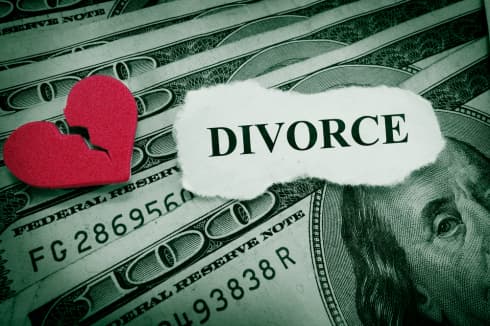
Get rid of your debt faster with debt relief
Choose your debt amount
Or speak to a debt consultant 844-731-0836
- 4 min read
- Tell your divorce lawyer about your debt consolidation strategy.
- You can consolidate debt and file for divorce simultaneously.
- How divorce can impact four common debt consolidation tactics.
- Start your FREE debt assessment
You Can Consolidate Debt & Divorce at the Same Time
Divorce can be hard on your financial health. A divorce while you consolidate debt can add to your level of stress, and may jeopardize your completing a debt consolidation plan successfully.
Consolidate debt is a broad term that people use to mean different things. Debt consolidation can mean:
- A debt consolidation loan
- Debt settlement program
- A credit counseling debt management plan
- Bankruptcy
Let’s see how starting a divorce while already in each of these plans can change your financial picture. But before we do two notes of advice: Be especially careful about consolidating any debt your spouse created, or you two created together. Consult with your divorce lawyer before you start or stop a debt consolidation plan.
Talk to a Bills.com debt consolidation partner to learn your options for handling tough debt problems. The call is free, and you'll gain insight into how quickly you can reach debt freedom.
Divorce & Debt Consolidation Loans
Most debt consolidation loans are cash-out mortgage refinances. Most cash-out refinances take about 30 days to close, although some complicated ones will take longer. If you are somewhere in the middle of a cash-out refinance deal, talk to your divorce lawyer about this loan. Does it make sense to close the deal? Will you harm yourself financially if you refinance now?
A cash-out refinance might be a great idea in some situations. Usually, one spouse will want to own and stay in the family home. A refinance can put the home loan in possessor’s name alone. A cash-out refinance can put the loan in the possessor’s name and buy-out whatever equity the non-possessing spouse has in the property.
A cash-out refinance might be a bad idea, too. As mentioned, talk to your lawyer before you proceed with a refinance. Depending on your circumstances, moving ahead with a refinance before all of the deal-making is done may harm you financially.
Divorce & Debt Settlement or Credit Counseling
It’s common for a married person enrolled in a debt settlement or credit counseling plan to include joint accounts shared with a spouse. It’s also common for couples to put shared expenses on a card in one spouse’s name. This makes allocating the monthly payments in one of these plans challenging.
If you’re in a debt settlement plan and decide to divorce, you need to have a talk with your soon-to-be-ex-spouse about how you two plan to handle the cost of a debt settlement or credit counseling plan. If the debt was incurred by one spouse for their separate enjoyment (such as fishing gear or spa treatments), then it seems fair that spouse should bear the burden of the monthly payments. However, if the expenses were for medical bills or groceries, then it seems fair to split the monthly payment.
Your lawyer will advise you on how a court in your state would divide the cost of a debt settlement or credit counseling plan. But it’s always better for the two parties to reach an agreement than have a court impose one on them.
Unsure how to handle your debt? Let the Bills.com Debt Coach tool give you a customized report on your debt resolution options. It’s free!
Divorce & Bankruptcy
If you filed for bankruptcy, consult with your bankruptcy lawyer when you decide you are headed for a divorce. It is unlikely your bankruptcy filing will change. If you are in a court-supervised Chapter 13 payment plan, your lawyer may need to file a modification of your payment plan by showing proof of your changed circumstances.
If you have not yet filed bankruptcy, but plan to do so, talk with both your bankruptcy and divorce lawyers about your situation. If it appears the bankruptcy will result in you shouldering a large amount of debt, such as taking liability for an underwater home, you may want to file for bankruptcy after all of the dust settles. A bankruptcy lawyer cannot help you plan your finances before a bankruptcy, but he or she can advise you as to the consequences of your actions before you file.
Bills Action Plan
A divorce does not need to halt your ongoing plan to consolidate debt. Because you will make a full financial disclosure to your lawyer anyway, point out that you are presently involved in a bankruptcy, debt settlement program, credit counseling debt management plan, or loan consolidation, such as a refinance. Ask if you need to change strategies. Change your debt consolidation plan strategy only if your lawyer advises you to do so.

Get rid of your debt faster with debt relief
Take the first step towards a debt-free life with personalized debt reduction strategies.
Choose your debt amount
Or speak to a debt consultant 844-731-0836